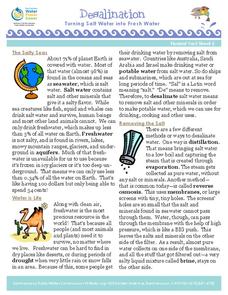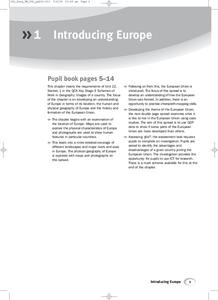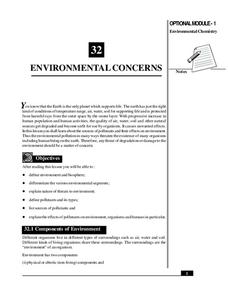Marine Institute
Water Pollution
Sixth graders investigate the various types of pollutants found in water and ways to help prevent water pollution. Through a hands-on experiment, students create samples of polluted water by mixing water with vegetable oil, dirt, and...
NOAA
An Ocean of Energy
Young biologists trace the path of the sun's energy through marine ecosystems in the second part of this four-lesson series. Building on prior knowledge about producers, consumers, and decomposers students are introduced to the concept...
Curated OER
Breaking News English: Noise Pollution in the Oceans
In this noise pollution in the oceans worksheet, learners read the article, answer true and false questions, complete synonym matching, complete phrase matching, complete a gap fill, answer short answer questions, answer discussion...
Wilderness Classroom
Pollution
Educate scholars on pollution—air, water, and land—with a series of lessons that begin with a thorough explanation of each type. Learners then take part in three activities to reinforce the importance of reducing pollution. They...
Chymist
Earth Science
Explore the consistency of the earth's layers and soil through modeling. By conducting an engaging experiment, learners develop a model for the earth's layers and a soil profile using edible materials. Each material is chosen based on...
It's About Time
How Do Plate Tectonics and Ocean Currents Affect Global Climate?
What do plate tectonics and ocean currents have to do with global climate? This fourth installment in a six-part series focuses on how plate tectonics and ocean currents affect global climate, both now and in the past, outlines an...
San Francisco Public Utilities Commission
Desalination: Turning Salt Water into Fresh Water
How does San Francisco supply its citizens with enough water, even during a drought? Learn about reservoirs and why desalination could be a good solution with a reading passage about water conservation. After kids finish the...
Berkshire Museum
Where’s the Water?: Acting Out Science Cycles
Young scientists transform themselves into rivers, oceans, clouds, and drops of water in order to explore the water cycle. After assigning and explaining to students their different roles in the activity, the teacher reads aloud a...
National Institute of Open Schooling
Water Pollution
Fifteen million children under the age of five die each year due to diseases in their drinking water. Water pollution is the topic of lesson 34 in the series of 36. Scholars, through reading and discussing, study numerous aspects of...
Geography 360°
Introducing Europe
Provide your learners with a comprehensive introduction to Europe with this great set of worksheets. Map activities include matching European countries to their capitals and places on a political map, as well as exploring different...
National Institute of Open Schooling
Environmental Concerns
Every year, more than 14 billion pounds of garbage is dumped into the oceans of the world, most of which is plastic and toxic to ocean life. Lesson 32 in the series of 36 focuses on environmental concerns, specifically pollution. Under...
National Institute of Open Schooling
Heavy Metal Contamination
An informative lesson focuses on heavy metal contamination of environments. Classes read about, discuss, and answer questions pertaining to sources of heavy metals in the environment. To finish the 35th installment of 36, individuals...
K5 Learning
Landforms
Valleys, mountains, and plateaus are just a few geographic landforms on our Earth. Read about these types and more in a brief landform passage. After reading, learners respond to six short answer comprehension questions.
Curated OER
How Coal Was Formed
Learners consider four diagrams of the Earth's crust, and decide which diagram best fits with the four descriptions on the worksheet. A simple, yet effective teaching tool.
Curated OER
End of WWI: The Treaty of Versailles
After learning about the causes and closure of WWI, hand out this resource on that outlines the differences between Wilson's 14 Point Plan and the Treaty of Versailles. The class reads the information provided then analyzes two political...
K5 Learning
Why Does the Ocean have Waves?
Six short answer questions challenge scholars to show what they know after reading an informational text that examines waves—what they are, what causes them, and how different Earth factors affect their size and strength.
Curated OER
Ancient Middle East Geography
As part of a study of ancient Middle East geography, kids locate seas, rivers, regions, and cities on a map of the region.
Forest Foundation
Forests, Carbon & Our Climate
To conclude their examination of forest ecosystems, class members consider the role forests play in the carbon cycle and how forests can offset climate change.
Illustrative Mathematics
Mile High
What is the meaning of sea level? This resource helps your class understand the meaning of elevations above, below, and at sea level. Provides for good discussion on using positive and negative numbers to represent quantities in the real...
K-State Research and Extensions
Water
How are maps like fish? They both have scales. The chapter includes six different activities at three different levels. Scholars complete activities using natural resources, learn how to read a map, see how to make a compass rosette,...
Curated OER
Ocean Voyage Scavenger Hunt
In this ocean voyage worksheet, students utilize the Internet to access one specific website to find the answers to five short answer questions about oceans.
Curated OER
Breaking News English: Moon Water
For this water on the moon worksheet, students read the article, answer true and false questions, complete synonym matching, complete phrase matching, complete a gap fill, answer short answer questions, answer discussion questions,...
Curated OER
Global Meltdown
In this environmental science lesson, learners study data and animation on global temperature increase to complete 8 short answer questions that follow.
Maine Math & Science Alliance
Earth as a System
Ecosystem, human body system, weather system. We hear the word system a lot, but what does it really mean? In the activity, pairs or groups of learners discuss how a bicycle is a system and then analyze objects in their classroom and...
Other popular searches
- Math Lessons on Oceans
- Pre K Lessons on Oceans
- Prue K Lessons on Oceans
- Drama Lessons on Oceans
- Pr K Lessons on Oceans

























